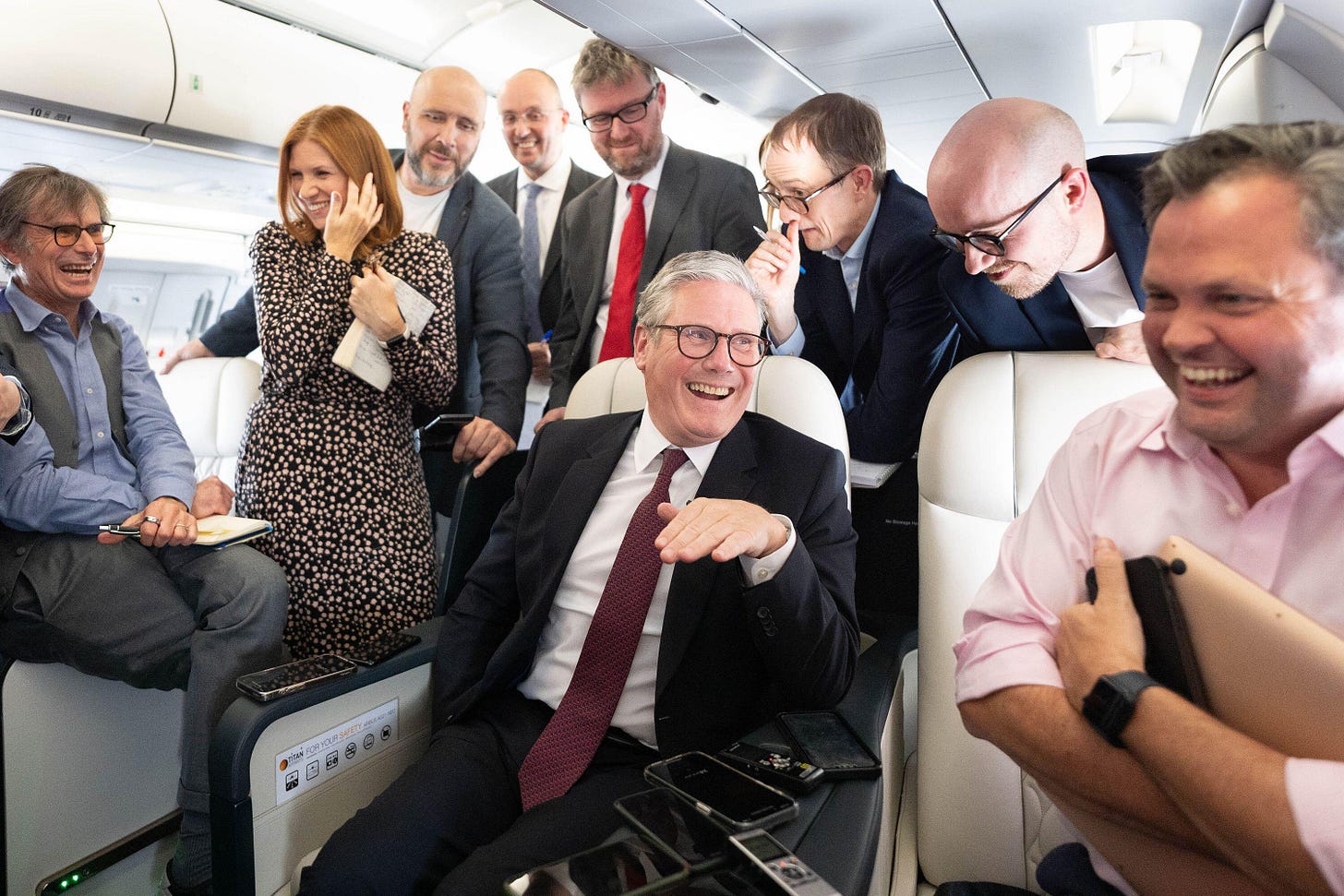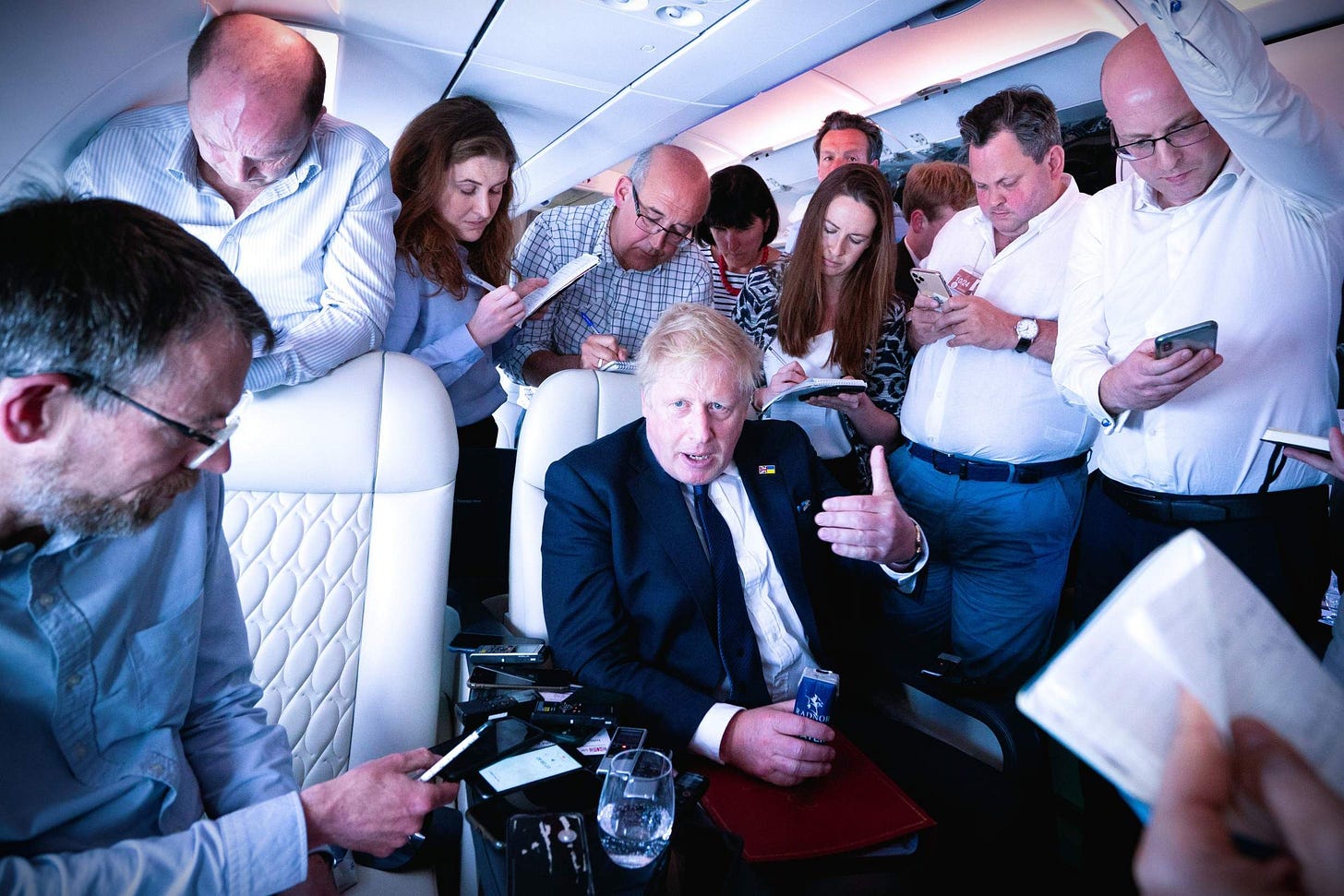It’s early days yet. No snap poll or single announcement by an administration just finding its feet in Whitehall and Parliament can yet determine which direction Keir Starmer will take the new Labour Government.
With this in mind, the recent photo taken of the Prime Minister en route to the US to meet President Joe Biden to discuss allowing Ukraine to use long-range Western weapons against Russia is just a fleeting snapshot. But it did highlight the problem with the political culture this Government has inherited.

Forget (if you can) for a moment Harry Coles’ career at the right-wing gossip site Guido Fawkes, his current position as Political Editor of the Sun, or his heading up of the Westminster Lobby – sat next to Starmer during the in-flight press briefing.
Forget, too, ITV News’ Political Editor Robert Peston’s anonymous briefings about the questionable ‘herd immunity’ strategy four years ago during the pandemic – also part of the press pack.
Let’s even put aside, for a moment, the lack of diversity among the transatlantic throng. As Carol Vorderman explained in her recent Alternative MacTaggart lecture – excerpted in the pages ahead – the news industry is increasingly unrepresentative of the country as a whole, more exclusively reserved for the wealthier middle classes.
As we have often detailed in Byline Times, there has been a damaging merger between the political and media classes – a revolving door and carousel of jobs and favours between government, print, and broadcasting.
So, with this in mind, are we supposed to forget the last decade of duplicity? That many of these same journalists either boosted or enabled the disastrous premierships of Boris Johnson and Liz Truss? The fact that many of the newspapers represented in this photograph backed a penuriously hard Brexit? That they weaponised fear and hate against minorities, migrants, and Muslims well before the violent riots of this summer? That they routinely print falsehoods, churn PR copy and advertorials, or recycle dodgy dossiers from Tufton Street-style opaque think tanks?
Should we forget that our newspapers are mainly owned by non-domiciled millionaires or billionaires, with hedge funder Sir Paul Marshall now joining the media oligarchy by purchasing the Spectator and bidding for the Telegraph? Why should pride of place go to the Political Editor of the Sun when the paper has paid out nearly a billion in settling claims for industrial-scale criminal activity? And why court Murdoch’s failing daily newspaper when his US outlets, especially Fox News, have promulgated false claims of voter fraud and enabled violent attempts to overthrow democracy in the very country Starmer was on his way to visiting?
Should we accept that that is ‘just the way things are’? That Starmer has to deal with the mainstream media and this is just business as normal; the way things are?
Though the Prime Minister has not agreed to the second part of the Leveson Inquiry into press ethics and criminality, and Labour voted to repeal the modicum of press regulation passed 10 years ago, he surely must know – especially as a former Director of Public Prosecutions who paved the way for the phone-hacking investigation – the background of the people he was sitting with in that photograph. If you sup with the devil, you have to use a long spoon.

Is that spoon long enough? Supporters of Starmer will argue that he is using the media and that he must communicate, regardless of the messenger. But the toxic co-dependence that the current political-media climate requires has helped to poison political discourse and allowed corruption and conflicts of interest to become a norm in our society.
The Labour Government appears happy to face hard decisions to address the parlous state of the economy after the depredations and decay of the last 15 years. Why not address one of the key causes of that: our political culture?
The Water We Swim In
The phrase comes from an old joke. An old fish is swimming along and meets two younger fish, commenting ‘isn’t the water lovely today?’ before gliding off. One of the younger fish turns to the other and asks ‘what’s water?’
Our Editor Hardeep Matharu often points out this ‘water we swim in’ – the soft-wired assumptions and legacies which constitute the social norms and habits we are largely unaware of.
This photo of Starmer with his press pack shows very little self-awareness about the problems of our political culture. And, if it remains unconscious, it is unlikely to change.
Culture, the far-right ideologue and one-time Donald Trump campaign manager Steve Bannon once observed, is ‘upstream of politics’. But as another, less problematic, American politician Daniel Patrick Moynihan once observed: while culture matters most, governments can change culture.
If Starmer is serious about renovating Britain, he will have to look at the media.
That’s why – as as successor to our successful #VoteWatch24 campaign during and in the run-up to the last General Election – Byline Times is launching a new #MediaWatch campaign to scrutinise the media, as our founding mission has always declared this newspaper will do.
Have you seen an example of false reporting in the press? Or disinformation online? Have you noticed another partisan article by someone not declaring an interest? Or a media company rigging the market or pulling in a political favour? What appears to be attempts at political interference? Is the BBC providing a false balance between a truth or a lie? Is GB News spreading a deadly conspiracy theory? Then let us know at mediawatch@bylinetimes.com
We’re particularly keen to follow disinformation online, especially on social media platforms owned by tech ‘broligarchs’ who use the cover of ‘free speech’ to expose dissidents to authoritarian governments or boost their commercial interests in this brave new world of ‘crypto corporatism’.
As Séamus Dooley, the National Union of Journalists’ assistant general secretary, has noted, there is an “existential crisis” in British journalism.
A study by the Reuters Institute has revealed that trust in news has now collapsed to 35%, down from 51% in 2015. Much of this is down to the rise of unregulated social media disinformation and algorithmic manipulation.
“The challenge today for politicians is to deliver a two-word response to the likes of Elon Musk and the second word is ‘off’,” Dooley recently told the Trades Union Congress. “Quite frankly, that cannot be the future of our society.”
We might not always be able to change the world to make it better, but we have a constant duty to stop it getting worse.









Share this post